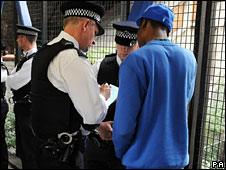Rules on stop and search changed
- Published
New restrictions are being placed on a controversial police power used to stop and search people, Home Secretary Theresa May has announced.
Police will now not be allowed to use the power unless they "reasonably suspect" a person of being a terrorist.
Last month, the European Court of Human Rights ruled the power to search people without suspicion under Section 44 of the Terrorism Act 2000 was illegal.
Shadow Home Secretary Alan Johnson said it will make the police's job harder.
Human rights campaigners Liberty said the original power had "criminalised and alienated more people than it ever protected".
The ruling followed a case brought by two people who had been stopped by police near an arms fair in London in 2003.
'Concerns over powers'
In a Commons statement, Home Secretary Theresa May said: "The first duty of government is to protect the public but that duty must never be used as a reason to ride roughshod over our civil liberties."
She said the European Court's judgement had found the use of Section 44 amounted to "the violation of the right to a private life".
The court found the powers were "drawn too broadly at the time of their initial authorisation and when they are used" and lacked sufficient safeguards to protect civil liberties.
Mrs May said: "The government cannot appeal this judgement, although we would not have done so had we been able.
"We have always been clear in our concerns about these powers and they will be included as part of our review of counter-terrorism legislation."
She said after taking legal advice and consulting with police forces, the use of Section 44 powers will now be restricted to searching vehicles.
'Important day'
Shami Chakrabarti, director of Liberty, said the lobby group had argued against the power for 10 years.
"It is a blanket and secretive power that has been used against school kids, journalists, peace protesters and a disproportionate number of young black men.
"To our knowledge, it has never helped catch a single terrorist. This is a very important day for personal privacy, protest rights and race equality in Britain."
Lord Carlile, the government's independent reviewer of anti-terror legislation, said Section 44 had been ineffective in combating terrorism, had caused community tensions and was used "arbitrarily and for incorrect purposes".
"Section 44 has given a lot of trouble and, in any event, it's now illegal," he told BBC Radio 4's The World At One.
"You don't have to search people to discourage terrorists, the evident availability of police officers in the area, obvious uniformed policing, is just as much of a deterrent."
Terrorist threat
Shadow home secretary Alan Johnson said the court's judgment was based on the way the powers were used "some years ago".
"The number of stop and searches under Section 44 has reduced considerably over the last two years," he said.

Many black and Asian people complain they were unfairly targeted
He said the decision would restrict the powers of the police.
The case that prompted the change was brought by Kevin Gillan and Pennie Quinton, who were both stopped outside the Defence Systems and Equipment International exhibition, at the Excel Centre in London Docklands, in 2003, where there had already been protests and demonstrations.
Student Mr Gillan was detained as he was cycling to join the demonstration, while Ms Quinton, a journalist, was in the area to film the protests.
Both the High Court and the Court of Appeal rejected their claim that such tactics were illegal, ruling that stop-and-search was legitimate given the threat of terrorism in London.
However, the European Court of Human Rights (ECHR) disagreed, and declared it an unlawful violation of an individual's right to privacy and family life.
- Published10 June 2010